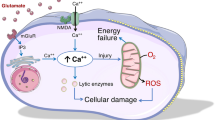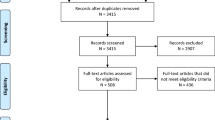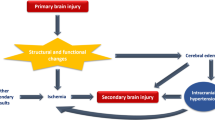Abstract
Recovery without residual neurological damage after cardiac arrest with temporary cerebral ischemia is rare. Therefore, it is most important that every effort is made to prevent brain damage occurring immediately after successful cardiopulmonary resuscitation. We report herein the cases of three patients who suffered either cardiogenic or hypovolemic shock and were resuscitated by a cardiopulmonary support system followed by mild hypothermia. All three patients recovered completely without any neurologic damage. The outcomes of these three patients demonstrated that mild hypothermia may be important for cerebral preservation after cardiopulmonary resuscitation.
Similar content being viewed by others
References
Sterz F, Zeiner A, Kurkeiyan I, Janata K, Mullner M, Domanovits H, Safar P (1996) Mild resuscitative hypothermia and outcome after cardiopulmonary resuscitation. J Neurosurg Anesthesiol 8:88–96
Kim Y, Busto R, Dietrich WD, Kraydieh S, Ginsberg MD (1996) Delayed postischemic hyperthermia in awake rat worsens the histopathological outcome of transient focal cerebral ischemia. Stroke 27:2274–2280
Gelman B, Schleien CL, Lohe A, Kuluz JW (1996) Selective brain cooling in infant piglets after cardiac arrest and resuscitation. Crit Care Med 24:1009–1017
Svensson GL, Crawford SE, Hess RK, Coselli SJ, Raskin S, Shenaq AS, Safi JH (1993) Deep hypothermia with circulatory arrest. Determinants of stroke and early mortality in 656 patients. J Thorac Cardiovasc Surg 106: 19–31
Fessatidis TI, Thomas LV, Shore FD, Sedwick EM, Hunt HR, Weller OR (1993) Brain damage after profoundly hypothermic circulatory arrest: correlations between neurophysiologic and neuropathologic findings. An experimental study in vertebrates. J Thorac Cardiovasc Surg 106:32–41
Marion DW, Leonov Y, Ginsberg M, Katz LM, Kochanek PM, Lechleuthner A, Nemoto EM, Obrist W, Safar P, Sterz F, Tisherman SA, White RJ, Xiao F, Zar H (1996) Resuscitative hypothermia. Crit Care Med 24 (Suppl): S81-S89
Laptook AR, Corbett RJ, Sterett R, Garcia D, Tollefsbol G (1995) Quantitative relationship between brain temperature and energy utilization rate measured in vivo using31P and1H magnetic resonance spectroscopy. Pediatr Res 38:919–925
Wass CT, Lanier WL, Hofer RE, Scheithauer BW, Andrews AG (1995) Temperature changes of greater than or equal to 1 degrees C alter functional neurologic outcome and histopathology in a canine model of complete cerebral ischemia. Anesthesiology 83:325–335
Author information
Authors and Affiliations
Rights and permissions
About this article
Cite this article
Yamashita, C., Nakagiri, K., Yamashita, T. et al. Mild hypothermia for temporary brain ischemia during cardiopulmonary support systems: Report of three cases. Surg Today 29, 182–185 (1999). https://doi.org/10.1007/BF02482247
Received:
Accepted:
Issue Date:
DOI: https://doi.org/10.1007/BF02482247




